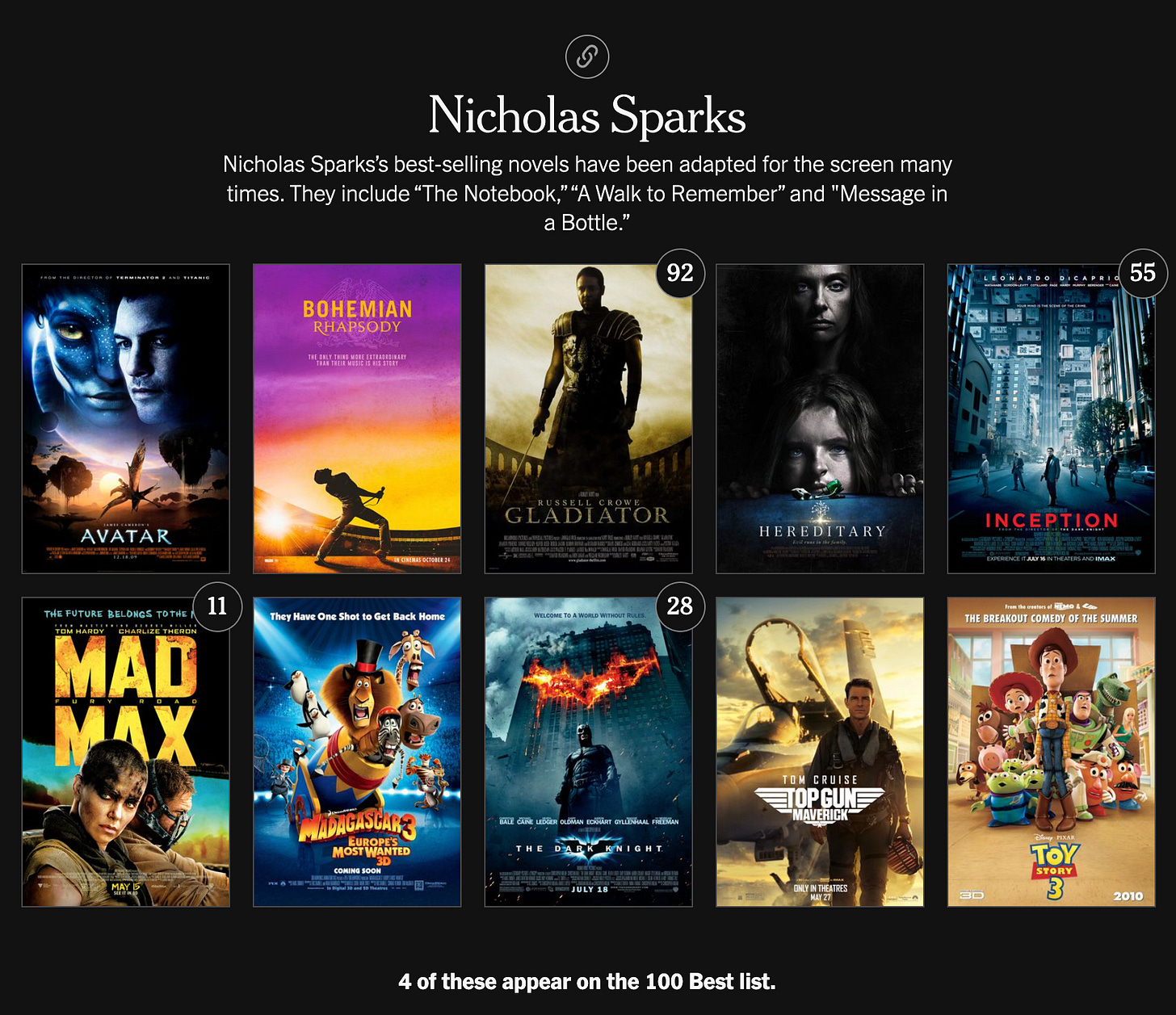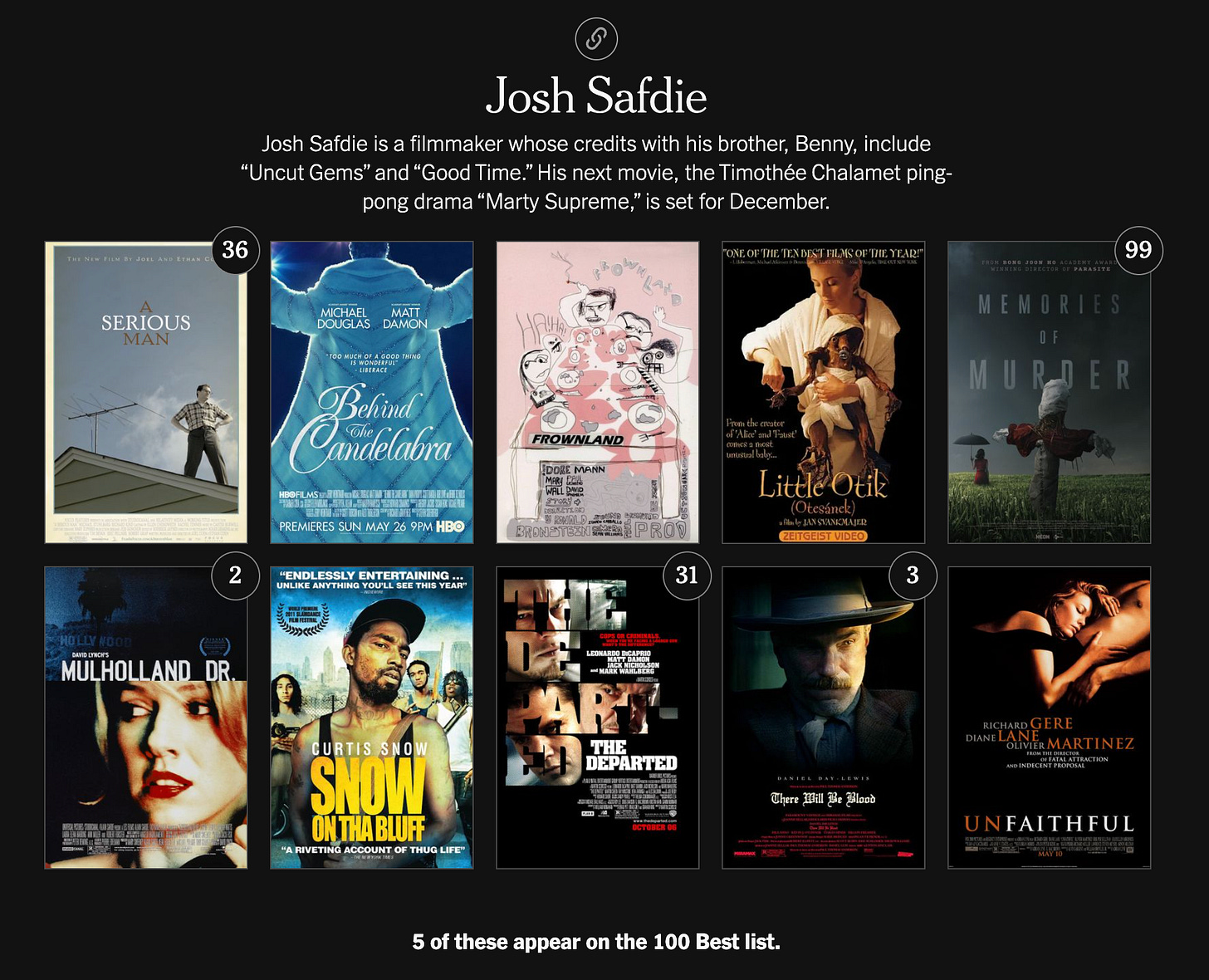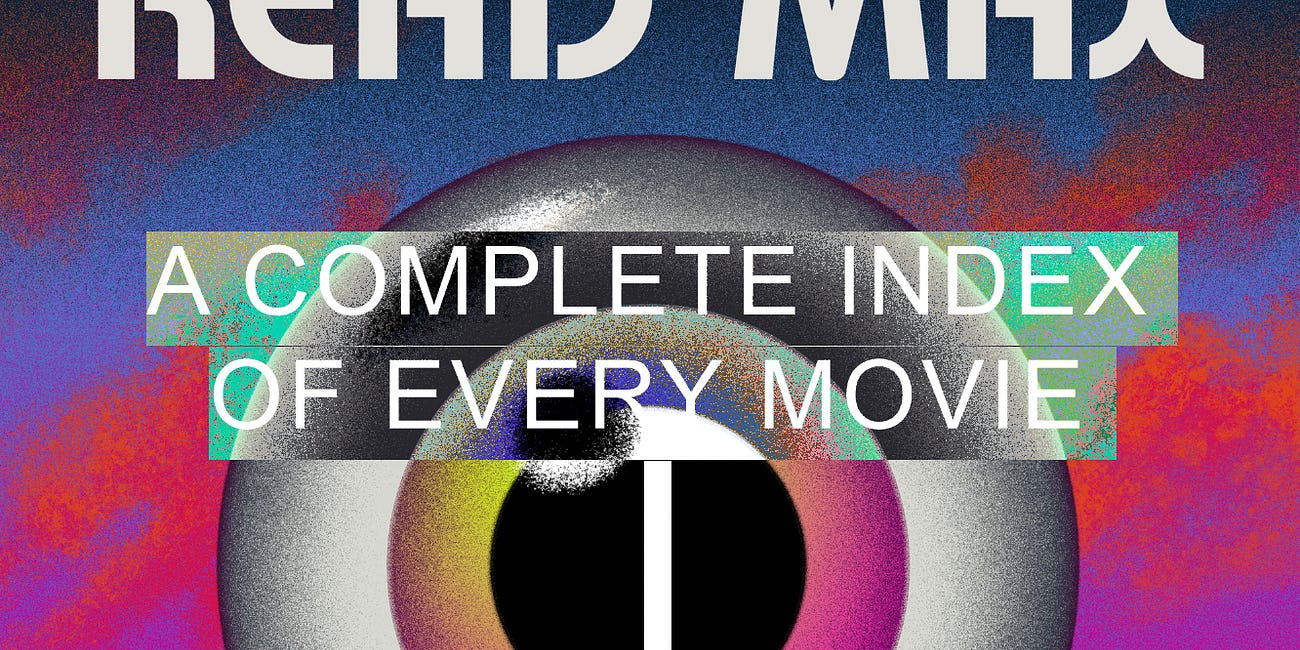Greetings from Read Max HQ! In today’s newsletter, a list of great movies, and advice on cultivating insane film opinions.
A reminder: Read Max is a subscription newsletter. Without the support of generous readers, it simply would not exist, or it would exist as a twice-a-year scratchpad for bad ideas, because I wouldn’t be able to devote any of the time necessary to producing the piercing, if erratic, and only intermittently correct opinions and arguments contained herein. If you have been enjoying this newsletter--and if you like book and movie recommendations, which are provided weekly to paying subscribers--consider upgrading your subscription to paid for the low price of about one beer a month, or $5--a small outlay for roughly 20,000 words a month, most of which are good.
For a variety of reasons, mostly the early involvement of the French, film criticism, more than any other critical practice, has a long and treasured tradition of bafflingly insane counter-consensus opinions. People love to get annoyed at The New Yorker’s Richard Brody for writing negative reviews of widely praised movies like Anora or Tár, but they fail to understand that what is culturally prized among real movie perverts is not adherence to the common view but facially indefensible, finely articulated, intellectually challenging against-the-grain readings like Brody’s belief that Eddie Murphy’s Norbit is “a psychodramatic outpouring of bile, pain, conflict, and sheer comedic invention [that] deserved to be hailed as a masterwork.”
Because of my own personal affection for this critical mode--my love for, e.g., Armond White’s annual “Better Than” lists, a thrilling, hilarious exercise in performing critical superiority through public luncy--my favorite part of The New York Times’ “100 Best Movies of the 21st Century” package, rolled out this week, was not really much the master list itself. As you might expect from a list that emerges out of a polling exercise, it’s crowded with relatively predictable, consensus picks1 rather than unconventional ones; you probably could have guessed the top 20 well before it was published on Friday.
No, my favorite part was the individual ballots, many of which are published at the Times. It’s in these lists, and against the consensus canon provided by the New York Times, that you can measure the real pretentiousness, contrarianism, cleverness, authenticity, or derangement of the various actors, directors, producers, and writers whose ballots are public.
singles out the romance author Nicholas Sparks for having maybe the most “chaotic” ballot. I would not say this is a list of great movies, speaking for myself, but, as Fran writes, it “feels largely reflective of the person who made it,” and by that measure is charming and memorable; it’s also, in its total absence of a unifying critical sensibility, a kind of dark mirror of Cahiers du Cinema’s equally baffling but much more high-brow annual top ten lists:Compare it to, say, former Sony chief Amy Pascal’s ballot, which feels more like an attempt to “objectively” list the 10 best movies of the century--and, in so doing, suffers from a fatal dullness, despite listing a much better set of movies than Sparks:
At the opposite end of the spectrum from Pacal is John Waters’ ballot, not a single selection from which made it to the final list. This is a wonderfully constructed bit of critical art that relies on the delicate three-way interplay between acclaimed arthouse depressants like Dancer in the Dark (expected); the already-period, political-camp thriller United 93 (surprising); and Butt Boy, a movie about a serial killer who disappears people up his both (both expected and surprising at the same time).
A different version of the counter-consensus ballot comes via Luca Guadagnino: If you’re only going to have one overlap with the master list, better to make it a very high-ranked one, to make the non-overlapping remainder even more confusing. Guadanigno’s tremendously baffling inclusion of John Carpenter’s Ghosts of Mars and Brian DePalma’s Redacted--two great directors’ worst movies--elevates the ballot even further:
I am personally always tempted by the path of counter-consensus. When the first portion of the list was revealed on Monday, I built an extremely personalized and intentionally contrarian--but authentic to my taste--ballot that I shared with friends:
I like the general mix of naked genre flicks, foreign and experimental arthouse, and overlooked Hollywood pop masterpieces, but my main self-criticism here is that there is a relatively consistent critical sensibility and thematic interest at play among these movies, and a clear preference for genre and straightforward narrative, which I think make this list not quite as baffling as a truly great insane list would be. (It’s too serious and too boyish; it needs, like, one Lav Diaz movie, one gentle French family-relationships movie, and maybe a totally forgotten studio romcom to fully get there.) Nevertheless, friends agreed that this list was “pretty annoying.”
But I tend to think that full counter-consensus lists should be reserved for people like Waters, who’ve earned the right to be stubbornly insane and individual in their taste. In between Pascal and Waters we have a ballot like Josh Safdie’s, which overlaps significantly with the main list while also introducing surprising and counterintuitive choices, mixing the high (Czech artist Jan Švankmajer’s tree-stump baby fable Little Otik) with the low (Damon Russell’s legendary found-footage epic Snow on tha Bluff) with the confusingly mediocre (Adrian Lyne’s erotic thriller Unfaithful???):
Safdie’s strategy here is close to the path I took for my ballot in the “100 Best Books of the 21st Century” project, which I wrote about last year. The basic idea is to establish some sense of shared reality with the audience with a selection of consensus picks, and then go wild and throw in some personal favorites.
It’s also what I’d have done if I was submitting a ballot for this list. As in the case of the books, you need a good mix from at least three categories:
1. Obvious Choices
Every ballot needs a few picks from the “everyone knows that movie is great” consensus to establish a shared reality with the audience. This is the stuff that made the main list, and that you certainly don’t need me to sell you on, but that exists so that you can see you can trust my taste.
Mulholland Drive (2001), dir. David Lynch: This is the My Brilliant Friend of movies--a consensus best that's fully deserved.
Inglourious Basterds (2009), dir. Quentin Tarantino: On any given day I go back and forth between this and Once Upon a Time… In Hollywood, but I think I lean toward Inglourious Basterds because of how good it is at building (and releasing) tension over its long runtime.
Phantom Thread (2017), dir. Paul Thomas Anderson
A Serious Man (2009), dir. Joel and Ethan Coen
Children of Men (2006), dir. Alfonso Cuarón
A Prophet (2009), dir. Jacques Audiard: Simply the best gangster movie of the 21st century, and maybe the best lead performance in any movie. Why Jacques Audiard is doing whatever it is he's doing now, instead of more stuff like this, is completely baffling to me.
Michael Clayton (2007), dir. Tony Gilroy
Gone Girl (2014), dir. David Fincher: To me this is like a better, more perverse Fight Club; an even funnier penetration of American gender performance and sexuality.
Mad Max: Fury Road (2015), dir. George Miller
2. Outside Chances
This is the stuff that’s a little bit surprising or challenging, but still largely acceptable--the excellent genre fare, non-consensus bests of otherwise lauded directors, and the for-whatever-reason forgotten movies that deserve more attention.
Inside Man (2006), dir. Spike Lee: It's crazy to me that The Departed (which I also love, don't get me wrong!) gets more shine than this even better big-city cop thriller.
Election (2005), dir. Johnnie To: Johnnie To not making it to the Times list is a real travesty. This is up there with Fury Road as a contender for action movie of the new millennium.
A Touch of Sin (2013), dir. Jia Zhangke: Four noir-ish stories about violence and revenge in modern China. Sleek, compelling, utterly haunting.
Bright Star (2009), dir. Jane Campion
A History of Violence (2005), dir. David Cronenberg
American Honey (2016), dir. Andrea Arnold: Greatest soundtrack of the century, if nothing else.
Los Angeles Plays Itself (2003), dir. Thom Andersen: Not just a supremely good meditation on the way Hollywood (the industry) both memorializes and consumes Los Angeles (the city), also a great, somehow comforting movie to put on as you go to sleep.
Miami Vice (2006), dir. Michael Mann: Genuinely surprised this didn't get even a low placement! It will be on the 2050 version of the top 100, trust.
Do Not Expect Too Much from the End of the World (2023), dir. Radu Jude: Among other things I thought it was really impressive to range so fluidly from archival footage to diegetic social media video, and then land with a basically perfect 40-minute static shot.
Pacifiction (2022), dir. Albert Serra: "A sinister, hazy postcolonial conspiracy thriller where nothing really happens" is admittedly about as designed-for-me-in-a-lab as it gets.
Morvern Callar (2002), dir. Lynne Ramsay: One of the best movies where British people have a bad time in Spain (a high bar!).
3. Personal Favorites
This is the real “insane opinions” stuff for which I personally will advocate passionately, and truly believe is great, but also do not expect anyone else to remember, care about, or love nearly as much. Having been lulled into complacency (or intrigue) by my more generic choices, you now feel comfortable trusting these selections.
Ghostbox Cowboy (2018), dir. John Maringouin: As I’ve said a few times, I can’t believe this movie--a kind of docu-fictional horror-comedy about an American trying to bootstrap a supernatural electronics business in Shenzhen--isn’t talked about more often? Somehow manages to be both Tim and Eric's New Rose Hotel and Zhao Liang's Apocalypse Now in the same two-hour movie, an incredible document of the American vision of China in the late 2010s.
Atlantics (2019), dir. Mati Diop: I adored this spooky Senegalese romance. Arguably the best cyberpunk movie of the century. My favorite thing is the huge sinister tower looming inexplicably over Dakar.
War of the Worlds (2005), dir. Steven Spielberg: My version of Armond White’s “better than” for this list is that the first hour and change of War of the Worlds is better than Children of Men. Maybe the clearest example, as a whole movie, of Spielberg’s sentimentality working against his incredible instincts as a filmmaker.
Azor (2021), dir. Andreas Fontana: An absolutely incredible Halogencore period thriller that I wrote about here.
Pulse (2001), dir. Kiyoshi Kurosawa: Made in 2001 and still unbeaten as the internet movie of the century.
Kill List (2011), dir. Ben Wheatley
Red Rooms (2023), dir. Pascal Plante: This and Kill List are both up there with Pulse as bad-vibes cinema goes. Just a tremendously, enjoyably ghoulish time at the movies.
Boarding Gate (2007), dir. Olivier Assayas: See “S.E.Z. Noir.”
I think to make a good ballot out of this, you need four from category one, and three each from categories two and three. Really any randomly chosen would do--it’s so hard to pick between any of these movies as the “best” when so much of what appeals to me about them is individual and idiosyncratic.
One final tout: If you like movie recommendations--especially if you like these movie recommendations--don’t forget that this very newsletter publishes a weekly recommendation roundup featuring new and old books, movies, and music, for paying subscribers only. For $5/month or $50/year you get both the weekly recommendations and access to the entire archive--including the “Watch List” of everything I’ve ever recommended!
THE READ MAX WATCH LIST
Among the most respected departments of Read Max’s globe-spanning newsletter operation is our “Good Movies to Watch” research division. Every week, paid Read Max subscribers are treated to at least one moving-picture recommendation, drawing on our team’s extensive knowledge of genres such as action, science-fiction, ‘90s thriller, and Weird Bullshit to bring you Good Movies that you maybe hadn’t heard of, or had forgotten about, or are simply glad to be made aware are now streaming on HBO Max or your service of choice.
I would describe the Times list as a consensus canon for “high middlebrow” film culture, which is where a lot of above-the-line Hollywood creatives live. The consensus canon for “low middlebrow” (this is where the Oscars used to live) is the IMDB Top 250; the consensus canon for “middle middlebrow” is the A.F.I. top 100 list; and the consensus canon for “low highbrow” is the Sight & Sound Greatest Films of All Time.














middle highbrow: TSPDT
high highbrow: piero scaruffi
if you live in LA, you can work the wry observations in Los Angeles Plays Itself into almost any conversation. I also really enjoyed the youtube short Vancouver Never Plays Itself.